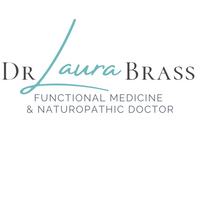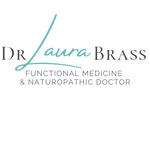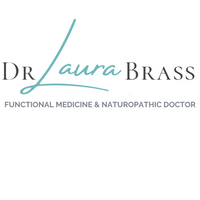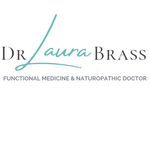8 Herbal Antibiotics and Supplements to Treat SIBO

Many of my patients are confused about the relationship of food to their digestive symptoms. For instance, I often hear:
“I eat something one day and I feel fine, but then I eat the same thing next week and I have an immediate exacerbation of my gut symptoms”.
Or
“It seems that the healthier I eat, i.e. the more veggies and fiber, the worse I feel, experiencing symptoms like, bloating, excessive gas, diarrhea, and/or constipation.”
This can be very frustrating – especially when you are trying to make healthy food choices so you can feel better!
So, what can you do?
I want to let you in on a gut health secret: 80% of the time, food isn’t the number one driver of digestive issues.
I know it seems counterintuitive. You feel worse after eating certain foods, so isn’t food the problem?
Well, specific foods can certainly amplify your symptoms, but often they aren’t the MAIN cause behind your persistent digestive upset. In most instances, your digestive symptoms are likely a gut microbiome problem.
After years of treating my patients’ digestive issues, I’ve found that most stem from an imbalance with their gut bacteria. The most common diagnosis is small intestine bacterial overgrowth (SIBO). SIBO is just as its name suggests – bacterial overgrowth in your small intestine. This can lead to symptoms such as bloating, excessive gas, constipation, diarrhea, or abdominal pain and indigestion and heartburn.
So what can you do if you’re experiencing SIBO symptoms? I’ll share with you why herbal antibiotics are beneficial, and eight supplements to treat your SIBO naturally.
The Benefits of Herbal Antibiotics and Supplements for Treating SIBO
Antibiotics, both herbal and pharmaceutical are the primary treatments for SIBO. Because most medical doctors still don’t recognize SIBO as the primary cause of IBS it can often be a frustrating endeavor to get the correct medicine from your GP or even gastroenterologist.
Additionally, many people develop SIBO after prolonged antibiotic use. So herbal antibiotics may prevent further complications for those whose SIBO was triggered by traditional antibiotics in the first place.
The good news is that treating SIBO with herbal antibiotic therapies has the equivalent efficacy to treating SIBO with the traditional antibiotic rifaximin (Zaxine)!
SIBO Treatment: 8 Herbal Antibiotics and Supplements
Herbal antibiotics, in addition to helping to eradicate the bad gut bacteria, can provide many additional health benefits for your digestive system. I’ll frequently combine the treatments below when treating my patients.
Now let’s get into the herbal antibiotics and supplements!
-
Oregano Oil
The first phase of gut treatment for SIBO is to eradicate the harmful bacteria in the small intestine.
One of the most frequently used herbal antibiotics for SIBO is oregano oil. Oregano oil is made from the oregano plant and has antifungal, antiviral, and antimicrobial properties.
You can take oregano oil orally to help with your SIBO, and the best form is through an emulsified tablet which bypasses the stomach having a full impact in the small intestine.
- I recommend taking two 200 mg oregano oil tablets two times per day for two to four weeks
- Nausea and vomiting
- Gastric distress
- Destruction of beneficial bacteria which may cause a decrease in optimal immune function
If you decide to incorporate oregano oil herbal antibiotics into your SIBO treatment, be sure to consult your naturopathic doctor. This way you can treat your SIBO with minimal to no side effects.
2. Uva Ursi Herbs
I often see patients who have more persistent and complex SIBO that’s often more challenging to treat. These patients often have extreme bloating with sulfur smelling gas and may not fully respond to oregano oil. For these patients, I turn to the herb, Uva ursi.
Uva ursi is a plant that’s commonly called bearberry because its red berries are eaten by bears. However, the leaves are used for treatment and not the berries.
It’s commonly used to treat urinary tract infections and fungal infections, but it can also treat bacterial infections like SIBO. This is because uva ursi contains glycosides, and these glycosides can transform into hydroquinone once they’re in our bodies. And this is crucial because hydroquinone has antibacterial properties.
Uva ursi herbs may be helpful in tricky SIBO cases because they target a specific type of bacteria called hydrogen sulfide-producing bacteria. These bacteria may not show up on breath tests that are commonly used to diagnose SIBO. However, they’re revealed on the GI-MAP test, my go-to test to understand the gut microbiome.
Uva ursi can be taken as capsules or tinctures. No matter which forms you prefer, make sure when you’re buying an herbal supplement that it’s a professional-grade product and is third party tested to ensure no harmful chemicals, toxins, or metals. It’s also important that you only take uva ursi herbs for a short period of time. If taken for a longer period of time or too high a dose, organ toxicity can occur.
Some side effects may include:
- Nausea and vomiting
- Digestive upset
- Stomach pain
And as with any supplement, be sure to speak with your naturopathic doctor before taking it.
3. Hydrolyzed Silver
It’s well-known that silver has antibacterial, antiviral, and antifungal properties. Positive silver ions can bind to bacterial cell walls and block the exchange of substances into and out of the cell. The silver ions can penetrate the cell walls and eventually destroy the bacteria’s DNA.
While many of you may have heard the term “colloidal silver,” hydrolyzed silver is different in that it has better antibacterial properties. It’s also very safe to take and is eliminated from the body so you don’t have to worry about toxic effects. Just like uva ursi herbs, hydrolyzed silver helps treat hydrogen sulfide SIBO.
4. MegaSporeBiotic™
After the bacteria from SIBO are eradicated, you may want to supplement with probiotics. MegaSporeBiotic is my go-to recommendation that combines the benefits of probiotics and antioxidants.
It’s a spore-based probiotic that contains five Bacillus spores:
- Bacillus Licheniformis
- Bacillus Coagulans
- Bacillus Clausii
- Bacillus Indicus HU36™
- Bacillus Subtilis HU58™
Does the idea of ingesting spores make you uneasy? Don’t worry – spore-based probiotics are different than you think.
Spore-based probiotics are also called soil-based probiotics. This is because these bacteria are commonly found in the soil.
Our ancestors would commonly grow produce, harvest them, and directly eat them without washing them. They would ingest the soil-based probiotics which help their overall digestive system. Now our society is hyper-hygienic, so each of us isn’t ingesting enough soil-based probiotics.
Spore-based probiotics can withstand your stomach’s acidic conditions so they can arrive in your gastrointestinal tract intact. They can also improve your gut microbiome, support your gut lining to prevent leaky gut, and boost your immune system.
Many of my patients have seen lasting and beneficial results from MegaSporeBiotics. They’ve also been able to heal their gut and reduce their recurrence of SIBO because of it.
The product isn’t available in Canadian supplement stores. It’s only available in the United States. Therefore if you’re located here in Canada but are interested in MegaSporeBiotic™, you can purchase it through my online supplement store here.
Gut Healing
After eradicating the harmful bacteria from your gut, I recommend supplementing with nutrients and herbs that can help reduce intestinal inflammation, boost your digestive immune system, and heal your gut. I use a combination of the following four supplements in this second phase of gut treatment.
-
L-Glutamine
L-Glutamine is the most abundant amino acid in your blood that’s been shown to enhance your gut barrier lining. In this meta-analysis study, glutamine also reduced the gut’s inflammatory response and decreased gut permeability in patients who just received abdominal surgery. L-glutamine can be taken in supplement form, and it’s also found in bone broth.
2. Licorice Root
Licorice root is another common herbal supplement that I recommend to my patients in the second phase of gut healing treatment. It comes from the root of the licorice plant and is found throughout Europe and Asia.
The benefits of licorice root include:
- Anti-inflammatory and anti-ulcer properties
- Digestive tract protection
- Production of mucin to aid digestion
Licorice root is commonly used in combination with other herbal supplements and remedies. Note that extract deglycyrrhizinated licorice (DGL) should be used instead of crude licorice root. This is because licorice root can have unwanted side effects such as increasing hypertension – DGL doesn’t give these side effects.
3. Aloe Vera
If you’ve ever experienced a burn before, you may have applied aloe vera to soothe your skin. Aloe vera can also be used as part of a SIBO treatment protocol to help soothe or heal your gut lining. It is also a stand alone treatment for other gastrointestinal irritations including GERD and other IBS symptoms needing gastrointestinal support.
4. Marshmallow Root
The last herbal supplement that I’ll mention that I use in the second phase of gut treatment is marshmallow root. The marshmallow plant is also known as the Althaea officinalis and is found in Europe, Asia, and Africa along water banks.
Marshmallow root has been used for centuries and can provide digestive relief. It works by coating and soothing irritated gut linings. It has anti-inflammatory properties that are important for overall gut health. It’s commonly used in combination with other herbal supplements.
Let’s Heal Your Gut
While SIBO is very common – especially for those with an irritable bowel syndrome (IBS) diagnosis – it can be hard to go through your days with the pain and discomfort that SIBO brings.
I want you to know that there is hope. While it may seem like a long road to recovery, you CAN find the root cause of your digestive problems and receive the proper treatment.
I want you to experience digestive freedom and to stop dismissing your symptoms as common or normal.
To learn more about SIBO and the other three top causes of digestive trouble, you can download my free IBS Myth e-book here.
If SIBO is the root cause of your digestive problems, you can then receive proper treatment!
Please note: These are recommendations that I give my patients. However, this blog is intended for informational use only. You should consult your doctor before taking any herbal antibiotics or supplements. If you’re looking for a naturopathic doctor who focuses on digestive health, you can schedule a free consultation with me here.
I conduct testing to determine the root cause of your digestive issues, and I will work with you to co-create a personalized plan to heal your gut. Your gut health protocol may include one or more herbal antibiotics and supplements that were mentioned above!
Let’s get to the root cause together,
Dr. Laura Brass




Leave a comment